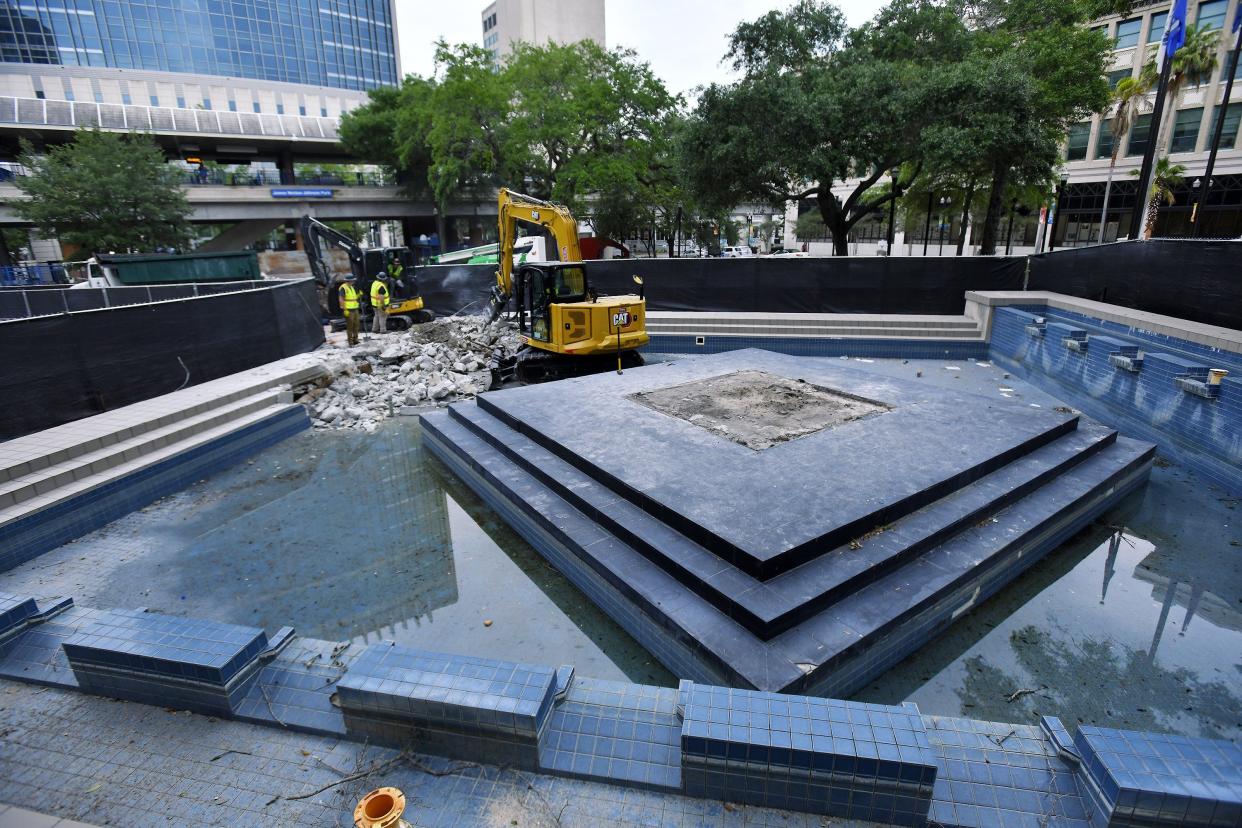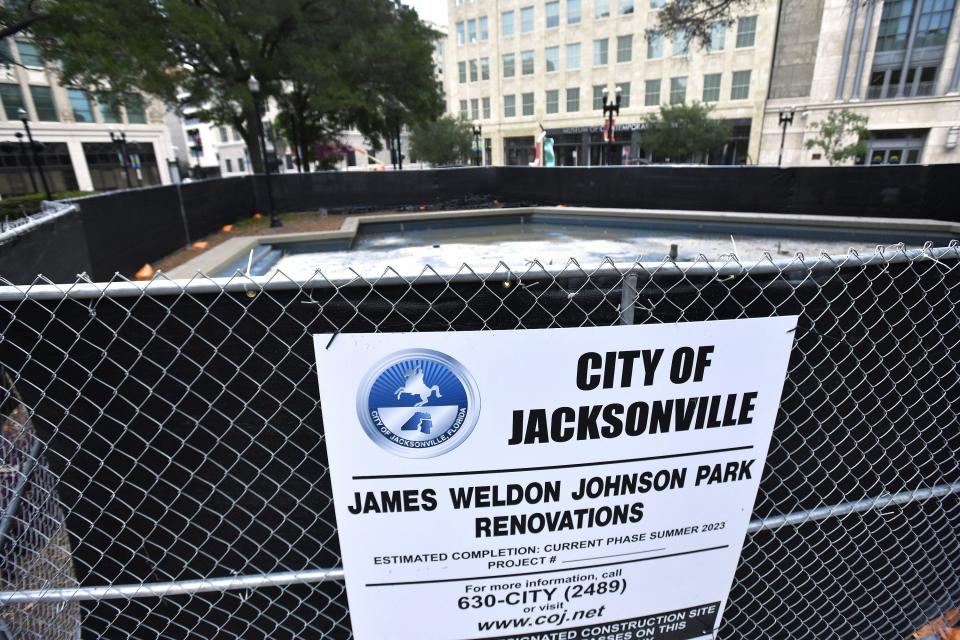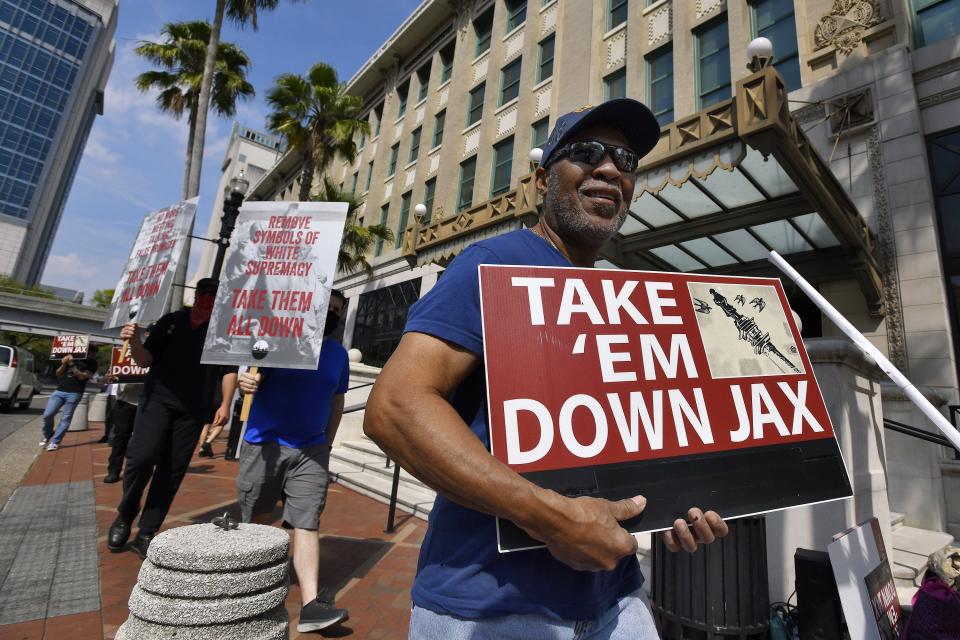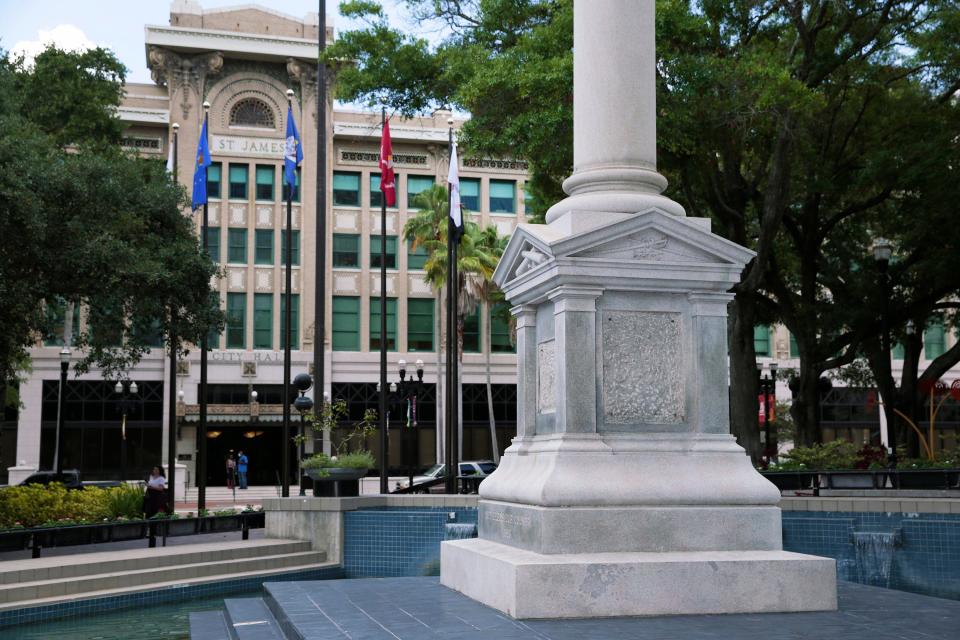Remainder of Confederate monument removed from park in front of Jacksonville City Hall

- Oops!Something went wrong.Please try again later.
The last remaining piece of a 125-year-old Confederate monument in the heart of downtown Jacksonville was removed unobtrusively from James Weldon Johnson Park across the street from the front entrance of Jacksonville City Hall.
The tall obelisk was taken down nearly three years after the June 9, 2020, removal of the bronze statue of a Confederate soldier at the top of the monument. The soldier statue was removed previously amid predawn darkness.
Mayor Lenny Curry ordered the statue's removal. At that time, Curry pledged to a crowd of peaceful protesters that he would order the removal of all remaining public Confederate monuments throughout the city.
Curry's stance has been that city-owned property should not be the site of a monument that divides the community and represents racial hatred to some residents.
Neither Curry nor other city leaders could be reached immediately for comment regarding the removal of the obelisk in James Weldon Johnson Park. The obelisk had "Confederate Memorial 1861-1865" etched into the base of it.
Confederate monument controversy: All options remain for Confederate monuments after state bill dies in committee
Magistrate: 'Dismissal is warranted' in court fight over spending for Confederate monuments
Mayoral candidates divided: Views on Confederate monuments split on party lines
A city sign hanging on the chainlink fence surrounding the obelisk site stated work was underway to renovate James Weldon Johnson Park, Construction was projected to be completed this summer, according to the sign.
The obelisk's removal had been scheduled weeks in advance before it was taken down early Saturday morning, a city spokesperson told the Times-Union on Monday.
The James Weldon Johnson Park design has been concluded for weeks and the contractor’s work began this weekend.
Plans still are being finalized but the obelisk site most likely will become more greenspace, the spokesperson said.
The Northside Coalition of Jacksonville, which has organized rallies at City Hall against Confederate monuments, said the removal "is a step in the right direction but our efforts will not stop here."
"We will continue our protests until all Confederate symbols are removed from public property in Jacksonville," the group said. "These monuments glorify the Confederacy which fought a civil war to keep Black people in chains. They represent a legacy of white supremacy and racial hatred."
How many Confederate memorials have been removed in Florida? How many are left?
Last August, Friends of James Weldon Johnson Park, the nonprofit that manages the historic park at 135 W. Monroe St., approved a three-year strategic plan that calls for redesigning the park.
Two years ago, Jacksonville City Council renamed then-Hemming Park as James Weldon Johnson Park in honor of the Jacksonville civil rights leader who also was a poet, educator, diplomat and attorney.
Johnson and his brother composed "Lift Every Voice and Sing," which became known as the Black national anthem and had its first performance on Feb. 12, 1900, when 500 Stanton School students in Jacksonville performed it on Abraham Lincoln's birthday.
Born in 1871, Johnson served as a principal at Stanton School and later became a leader in the NAACP. President Theodore Roosevelt appointed him as the nation's consul to Venezuela and Nicaragua. He was the first African-American member of the Florida Bar. He was a key figure in the Harlem Renaissance movement.

Take 'Em Down Jax and the Northside Coalition as well as other community organizations plus individual church and civic leaders — both Black and white — routinely demonstrate peacefully to remind Curry of his promise to remove all Confederate monuments remaining on public property in the city.

Still standing and just as controversial, however, is the Confederate monument in Springfield Park.
City Council in another 2020 name change intended to separate Jacksonville from Confederate iconography, unanimously approved a bill rechristening Confederate Park as Springfield Park.
Renaming it Springfield Park, however, hasn't ended the outcry over the park's Confederate linage.
Take 'Em Down Jax protesters still rally each Friday in front of City Hall demanding the removal of the Confederate monument from Springfield Park. Organization leaders couldn't be reached immediately for comment.
Meanwhile, an attempt to stop local governments from moving historic monuments and memorials off public land didn't come up for a final vote in this year's session of the Florida Legislature, leaving all options on the table for decisions about the fate of Confederate monuments that have polarized communities.
State Rep. Dean Black, R-Jacksonville, said he will bring the measure back up in the 2024 session.
Curry proposed $500,000 for removing the Springfield Park monument when he unveiled his budget last summer. City Council agreed to keep the money when it approved the 2022-23 budget, which runs through the end of September but changed the line item to say the options also will include leaving the monument where it is or renaming it.

Meanwhile, a University of North Florida poll released Feb. 28 found 79% of Democrats support moving Confederate monuments from public space. Among Republicans, the view was reversed with 83% opposed to moving such monuments off public space.
The Southern Poverty Law Center, which supports removing Confederate monuments from public space, said in April that 482 Confederate symbols have been removed, renamed or relocated since June 2015 in all states.
The organization says about 2,600 Confederate symbols are still in public places, and seven states across the South have laws to block the removal of Confederate memorials. Florida would have become the eighth state, according to the Southern Poverty Law Center.
This article originally appeared on Florida Times-Union: Remains of a Confederate monument removed from Jacksonville city park

